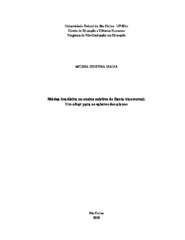Música brasileira no ensino coletivo de flauta transversal: um olhar para os saberes dos alunos
Abstract
This study was carried out during the collective flute teaching classes at Projeto Guri, in the city of Ribeirão Preto, in the interior of the state of São Paulo. Projeto Guri is a socio-cultural music education program that aims to offer, in the school day, some types of musical courses for children and teenagers between 6 and 18 years old. We sought to understand the educational processes resulting from the use of a repertoire of Brazilian music, considering its importance for cultural identification and appreciation of the student in this context. In this context and with the perspective that many learnings could arise among students from the use of this repertoire, we proposed the following objectives: to identify, describe and understand the possible educational processes arising from a collective musical practice in which popular culture songs were inserted Brazilian. To achieve the objectives established here, we adopted the participatory research methodology, in which the data collection started from the insertion of the researcher and teacher in the space of the classes, in which proposals with a repertoire of Brazilian music were developed. As a registration tool, we used the writing of field diaries throughout the period of data collection, and some drawings made by students during classes also served to understand the processes. After identifying the educational processes and analyzing the data, we created the category KNOWLEDGE OF STUDENTS, describing the results presented during the activities. We emphasize that the involvement and receptiveness of students during the performance of activities, contributing to the preparation of this study. As a result, the understanding about the recognition of the Brazilian cultural identity, the valorization of the Other, involving their way of life, their culture, and their knowledge for the construction of their knowledge can be observed. We witnessed the awareness, appreciation and re (construction) of learning in the circles of conversation and application of activities promoting the humanization of the group. We believe that this study can contribute in some way to the understanding and reflection on the effective use of the Brazilian music repertoire in collective music teaching based on humanizing education, cooperating not only for the acquisition of musical knowledge, but for an education in which everyone educate themselves collectively, where students are able to understand and dialogue respecting and valuing brazilian culture.
Collections
The following license files are associated with this item:

